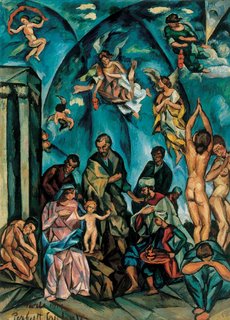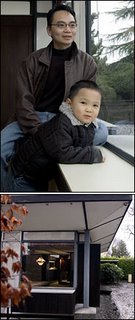Hodge-podge




Repeating itself
In 'Little History,' a scholar revealed
The Times: 'The history of the world is, sadly, not a pretty poem," the art historian E.H. Gombrich wrote in his first book, a history primer for children, published in German in 1936. "It offers little variety, and it is nearly always the unpleasant things that are repeated, over and over again."Ah, Germany. Timeless struggle between the heights of civilization and the depths of barbarism. Whereas England seems to be the saucer that cools the tea.
Soon after its German publication, "A Little History" was banned by the Nazis for being "too pacifist." By then Gombrich had fled to England, where he worked for the BBC monitoring service during World War II and went on to a distinguished art history career, writing many scholarly books and heading up the exiled Warburg Institute at the University of London.
Who's sliming who?
Nick's Cultural Revolution
The Times: When Nickelodeon's popular "Kids' Choice Awards" program came to China last month, the producers were forced to make some serious modifications. There would be no voting on favorite burp. Nor would children judge which movie character was the best at breaking wind.The article is the Time's usual 'look, how exotic' take on China; per usual, it's condescending and more about lecturing about the Chinese.
There was, however, sliming, a highlight of the American version of the show, which involves dumping, squirting and otherwise propelling green gooey stuff at people. And adults repeatedly were whacked by children - with balloon bats, of course - just to give the Chinese a taste of the freedoms afforded to children in the United States.
Perhaps the most surprising thing about the show's national television broadcast was that children in China seemed to think that even this much kinder, gentler version of the program was wonderfully, outrageously transgressive.
"This is just so much fun," said Wang Yinong, a shy 12-year-old girl who watched the show at home with her parents in Shanghai. "I'd really like to go there and do the same thing: slime people."
Sliming remains a novelty in China. While every American industry that comes here faces its own obstacles, the bar that exporters of children's television programming must vault is particularly high: a traditional culture of respect for parents and authority reinforced by decades of Communist discipline and the ruthless competitiveness of an educational system that favors rigor over imagination. ...
But with television programming in China entirely state-controlled, Western media companies must negotiate every nuance of programming. And experts say that parents here may be even more restrictive than the government, viewing American-style television as too unruly.
"It wouldn't be surprising if the government said no to programs like these," says Lei Weizhen, who teaches about television at People's University in Beijing. "The public may question whether or not these shows are good for Chinese children."
In the cutthroat competition of contemporary Chinese society, parents invest heavily in what is often their only child. Urban children especially may attend school from 7 a.m. till 4 p.m., followed by hours of homework, music lessons and other enrichment courses. Deviating from this rigorous program is not encouraged.
"We don't allow him to watch too much TV," Qiu Yi, a 41-year-old advertising salesman in Shanghai, said of his 11-year-old son. "I'm not against cartoons. But I try to encourage him to watch documentaries on dinosaurs and the Second World War. These programs are useful to his study."
What's on television in China seems to be not all too dissimilar from what's happening in the classroom. Youth programming in China tends to be dry, conservative and pedantic. It consists mostly of quiz shows, team competitions and endless lineups of youngsters, dressed uniformly, standing at attention and answering questions like Boy and Girl Scouts. ...
The names of children's programs here often reveal their content: "Seeking Answers to 100 Questions," "Reading Books," "Visiting Schools," "Chess Boy" and "Studying the Arts."
"The Big Windmill," a nationally broadcast program on China Central Television, recently featured a typical skit. It involved a couple of people who opened a new hotel and then overcharged travelers for their stay. Two of these travelers turned out to be government investigators, looking into just such crimes. The message of this show, which is intended for children 3 to 14? "Don't lie or cheat customers! And beware of undercover authorities!" ...
"A lot of children's programming is really bad in China," said Li Yifei, managing director of MTV Networks China and considered one of the most powerful women in Chinese television. "It's condescending and more about lecturing to children. Fun - that's what's desperately needed."
I wonder how long until the Times grows up in its coverage of a country five times our size and stops using America as the norm, with all deviations breathlessly reported as weird or strange. Heck, there are a lot of people in this country who think what's on our airwaves is insane.
What would Jesus do?
Greece Bars Commercial
The Times: A Greek media watchdog has turned a cold eye on a proposed Amnesty International commercial that pokes fun at the war on terrorism by announcing the arrest of Father Christmas and the Magi, classifying the three wise men as ''men of Arab origin transporting chemical substances of unknown nature.''I wonder if Amnesty tried to air this commercial in the U.S....
Going on to say that the four suspects were then taken to the American detention camp at Guantánamo Bay in Cuba, Amnesty International calls for fair treatment of terrorism suspects. This and two other Amnesty International advertisements were denied a free showing by the Greek national council for radio and television, a spokesman for Amnesty International told Agence France-Presse.
The council said that the ads carried no social message and only dealt with what it called foreign policy matters. Costis Papaioannou, a spokesman for the Greek branch of Amnesty International, said Amnesty did not accept any state funding, and so it could not pay for the broadcasts.
Free for the taking
That Tear-Down Could Be a Haul-Away
The Times: When Kingman Ho, a physician, bought a 1,000-square-foot 1960's house in Seattle's Mount Baker neighborhood in May, the sellers figured he would tear it down. But Dr. Ho was so intrigued by some of the house's quirky features, like a child's playpen that converts to a conversation pit for grown-ups, that he devised a way to try to save it.What do people in other countries think when they see articles like this? Gosh, the U.S. sure does care about its (limited) history... jeez, they really do throw everything away.
Dr. Ho is offering the house for $1 to anyone who is willing to remove it by February, when he plans to start construction on a new house. (So far, there have been no takers.)
Image from "A Little History of the World" via Yale University Press.
Nickelodeon photo of Michelle Kwan slimed in China via U.S. Figure Skating.
Vilmos Perlrott Csaba's 1914 oil painting Adoration of the Magi via Fine Arts in Hungary.
Photos of Kingman Ho and his son and house by Annie Marie Musselman in the New York Times.
No comments:
Post a Comment